Saying Goodbye to My Home in the Coffee Village in Wayanad
I woke up at 7:45, showered, and made breakfast: onion parathas and tea. We had to check out. Every raw vegetable was to be made and everything to be packed. I did the dishes, cleaned the kitchen, and heated the dinner leftovers. The food was on the table all night. There was no fridge. I boiled potatoes and washed okra. My partner Sagar and I walked around on the porch facing the estate, finally sitting down for a bit. By 11:30, I started to work. Just an hour and a half and then I’ll finish the rest of cooking. Sagar was working, too. He would do all the packing. I would wrap up all the food things. At 1, I got up and strolled around a bit. From the porch, I called, “Shobha, Shobha,” as she had asked me to do the previous evening.
“I was wondering why you didn’t call me.” Shobha walked to me.
“I was working and finishing cooking.”
Down a powdery mud path behind the verandah, we got into the sunny coffee plantation. Jackfruit trees stood tall in between the coffee shrubs. It was dry and hot, everything baking at the same temperature. Birds were quiet, if they were there. The rich-green coffee plants were recently harvested.
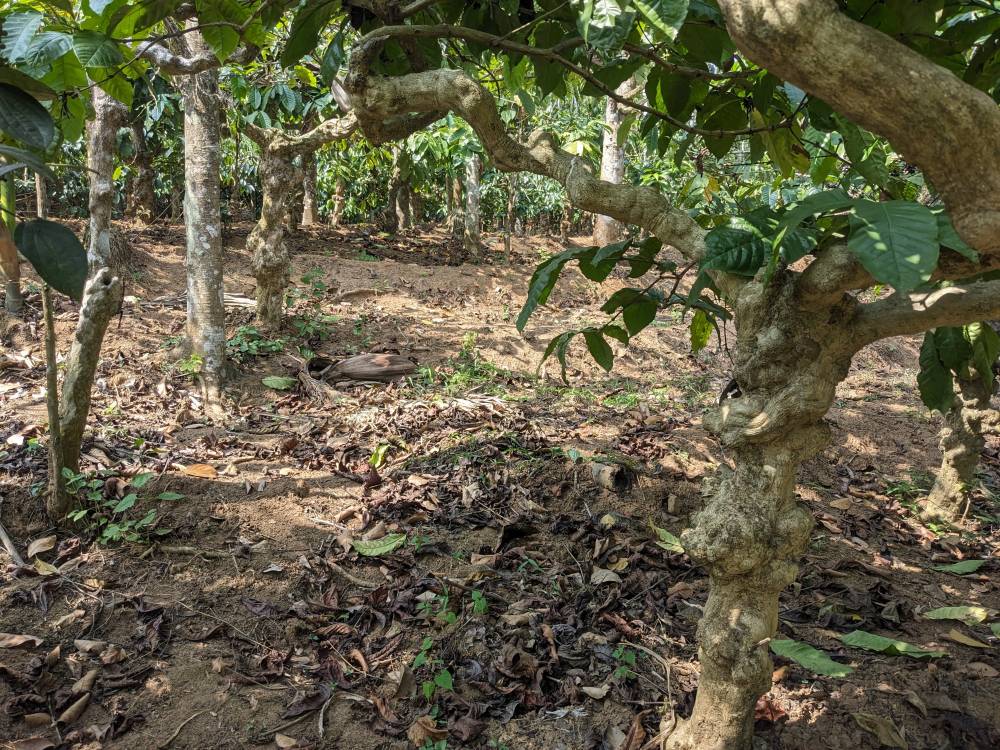
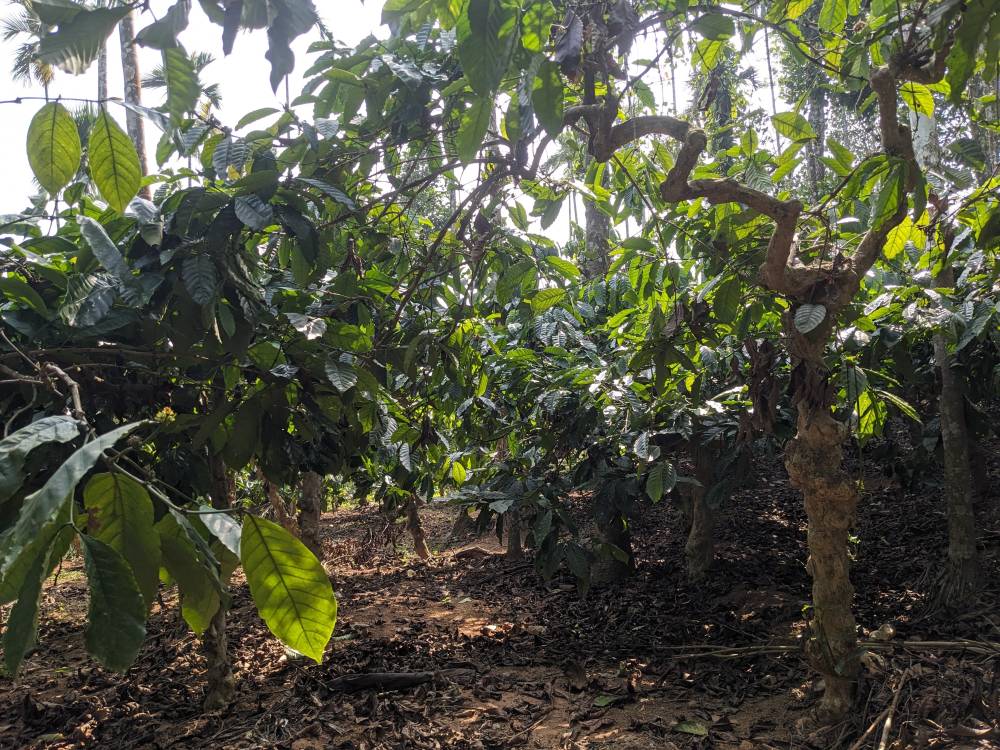
“Why were these left?” I asked, standing next to one of the coffee shrubs on which green and red beans shone.
“Maybe the workers missed them. My father’ll see and scold them.” Shobha smiled.
I didn’t pull a bean and crush or open it like I do to every berry, fruit, and leaf. It wouldn’t smell of coffee. I opened one sometime in the past. The gnarly dark brown coffee stems had woody, wrinkly knees. Two hands went up from each, holding the umbrella of coffee.
One can take a coffee plant as it is and put a glass on it and it’s a table. I said something of the sort.
Shobha laughed. “Yes.”
“Do you use this coffee at home?”
“Yes. But I don’t like coffee here.”
“Me neither.” I jumped. “It comes very powdery, like they try to dissolve the coffee but it doesn’t dissolve.”
“Yes. I don’t drink it. I like chai.”
I picked up a wilted jackfruit leaf from the ground. “Do you know why do they put jackfruits with coffee?”
“Perhaps to provide shade?”
We looked up at the jackfruits. “But their leaves are all trimmed. They have such few leaves.”
“Yeahhh. I don’t know.” Shobha squinted against the strong sun.
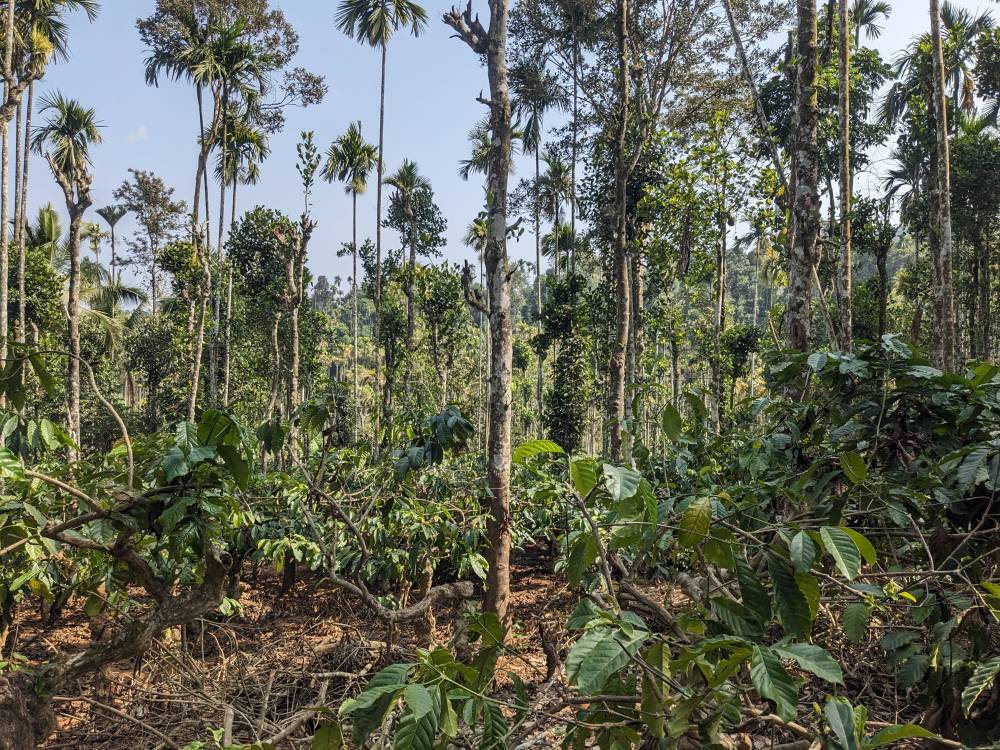
Pencil-long betel nut trees swayed, their fronds shaking as the uneven trims of a new-age nomad. Their yellow nuts, which hang like little coconuts, were also harvested. Shobha knew the betel nut process and told me—the same method of plucking, drying, and peeling as most nuts.
Lifting the coffee branches, scooching down under, we walked towards the end of the estate. A big grass-green field with rows of betel nut plants stretched to the other end. Cows grazed in the field, and egrets stayed at their tails. Probably there were more estates beyond the field.
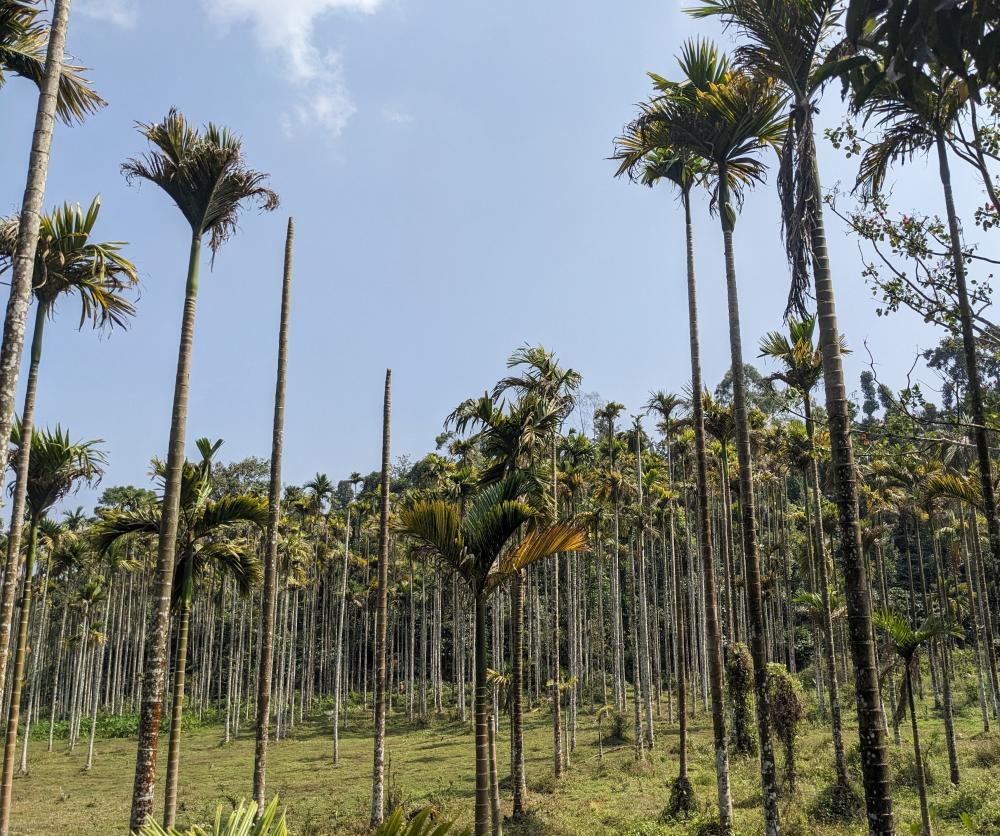
“I’ve been in this field. To the other end. From the ground, I climbed up onto the hill. I had to hold trees, and I got scratched. We can’t go into the field. See, this is all marsh. I got all wet last time.” Shobha pointed to the sodden patches.
“Is it really all water? Some places look dry.” I peered at the grass.
“All water.”
It was one of those times when I had to believe something I couldn’t see. Shobha must know. Water glistened in many places.
“Look, there’s a heron.” I pointed to the grey-white water bird. “There’re many.”
Shobha squinted. “Is that the one?”
“Yeah. She picks bugs and frogs from the water. Where there’s a little patch of water, you’ll find her.”
Many betel but trees were just long, ringed sticks, their leaves shed long ago. “Some of the betel nuts have lost their heads,” I said.
“The trees will die. They’re old or have gotten bad.”
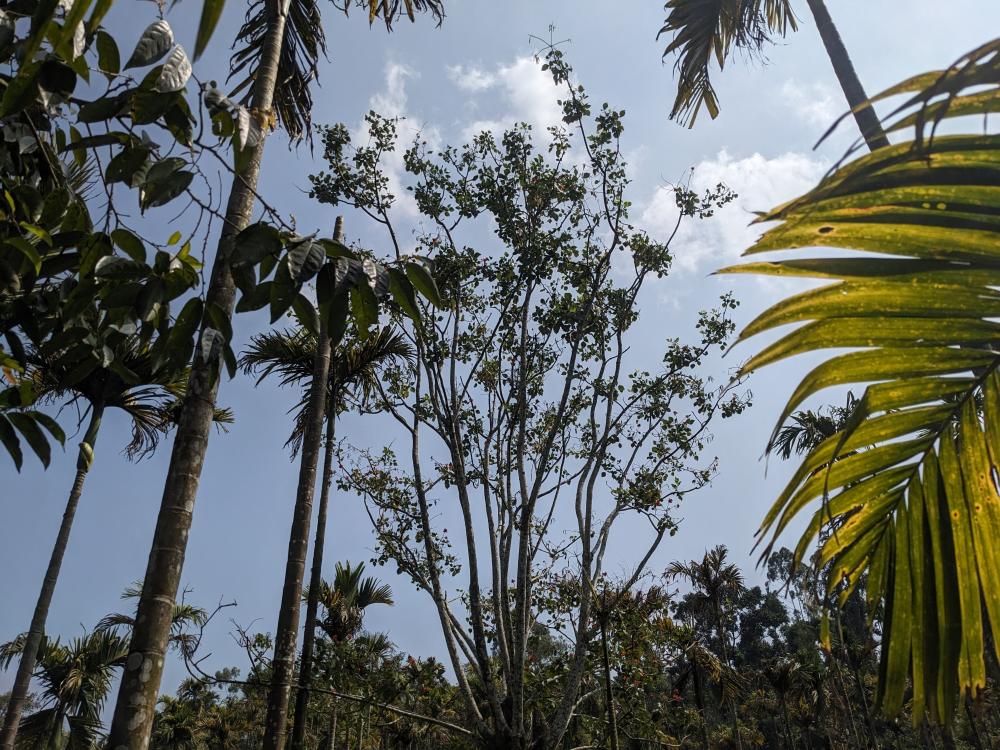
We didn’t know the name of the tree with the red flowers.
“Who’s that man?” The cows now had a herder with a stick in his hand.
“He’s a farmer. He grazes his cows in our fields.”
Shobha and I turned around.
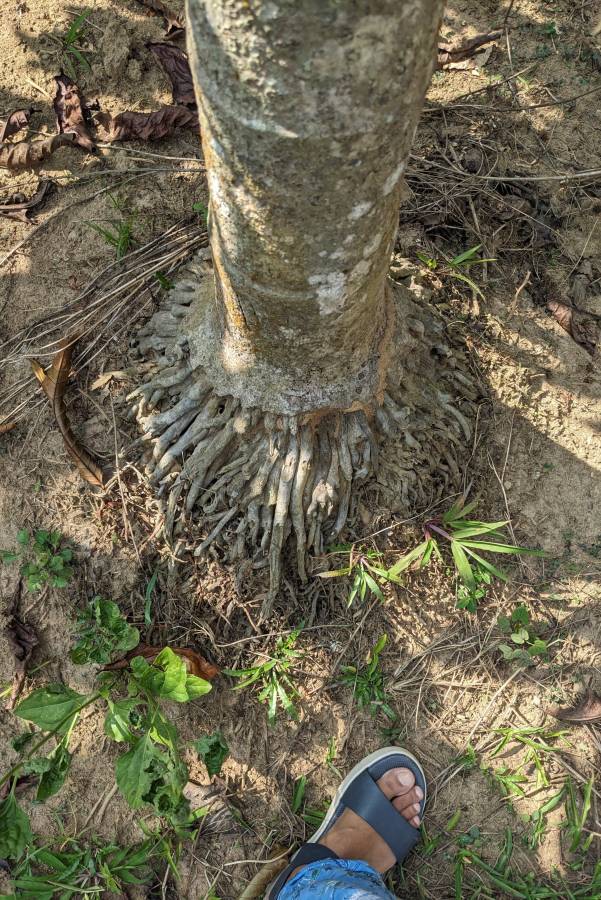
“How big are these coconut leaves!” I kicked one dry coconut frond lying on the ground.
“We call them pal. When we were little, we used to sit on one and our friends would pull us.” Shobha was smiling. “It was so much fun.”
I imagined Shobha as a little girl, atop the coconut frond and being dragged around by her friends. She would have laughed a lot.
“What’s that game the girls play? Behind the estate, where those women dry the coffee beans, the girls were playing with dry coconuts. They kept a few on one end. They all ran from the opposite end at the same time, picked up one coconut each, sprinted back as fast as they could, put it down, and went again until they stopped. They were racing to collect the most.”
“Oh. I don’t know the name. But, yes, there’re many games with coconuts.”
“Do you come to the estate often?” I hadn’t seen Shobha in the estate in the past couple of days.
“Yes.”
“The trees are good no? I like being amongst them.”
“Yes. Me too. There’s happiness in nature.”
“Especially when there’s no one.”
Shobha looked at me and smiled knowingly. “I go out to walk mostly. Out on the road. But they call me names because of it.”
“Because you walk?” I knew what she meant but wanted to hear it from her.
“If you break social barriers, people don’t like that. They consider you separate from them. People call me mad, mad when they see me walk on the road.”
Shobha was above forty and unmarried, a thing unheard of in India. She was thin. Her eyes were glossy. Her sun-heated skin was dry. Some of her hair was white. Her top and long skirt were old and used. Her teeth were stained. She didn’t have a care in the world for those things. The world wouldn’t like that kind of freedom in an unmarried woman.
“I can imagine. It’s the same everywhere in India. When I wasn’t married, everyone bothered me too. Now it’s better.” I didn’t want to go on about how a married woman is reminded of her role and place every second. “What do your parents say?”
“They are also like the society. They say the same things. They are uneducated. They don’t know,” Shobha said.
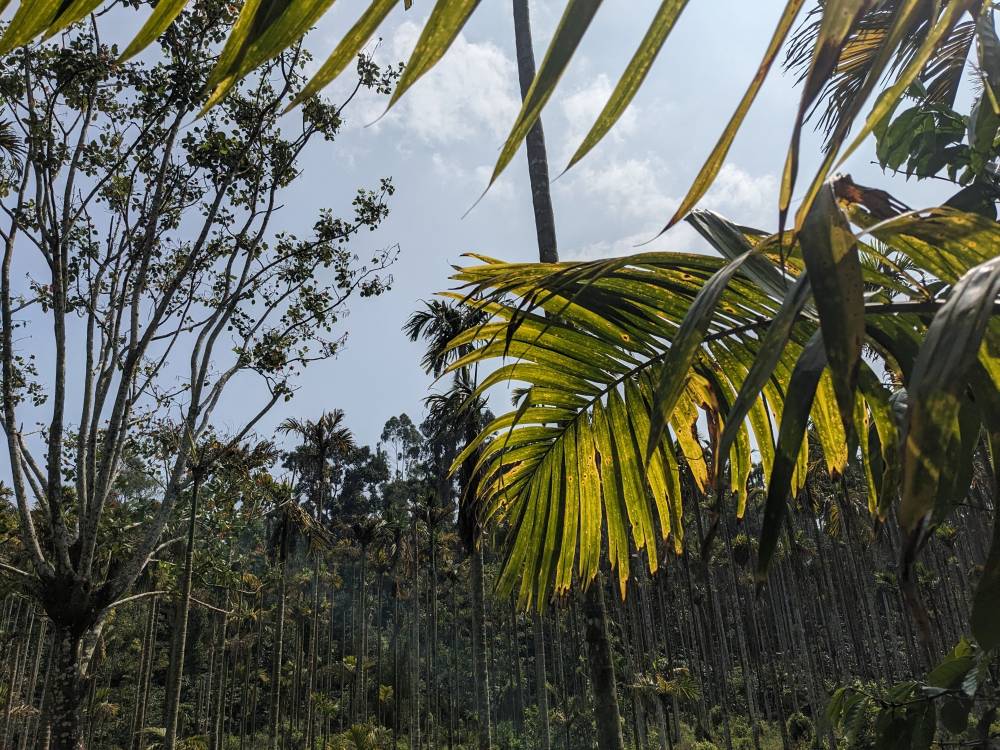
We started walking out of the estate, again bending under the coffee shrubs or skirting around them.
Shobha reminded me of some of my other single, female friends. They live different kinds of lives, are independent, and reject social conventions but are immersed in nature and natural phenomena.
Is there a connection between shedding the society and hugging nature? I guess so. When humans don’t understand us, we turn to our mother, the one who first held us in her belly.
“Did you take a jackfruit?” She asked as we climbed back up the mud path.
“No. I don’t see any.”
“Yeah, there are none. These trees are for coffee. Their leaves are all trimmed.”
“How do you make those sweet banana bhajjis?” The banana leaf in my face reminded me of the sweet banana pakoras I had been eating in the state.
“I think we cut the ripe ones, then put them in white flour, add some soda and salt, and fry. My mother makes them. Do you like banana chips?”
“Yeah. We don’t make them at home. They’re nice.”
“My mother has made some. I’ll get you some.”
“No. Please don’t bother.”
“I’ll get some. Should I make some banana Bhajji too? What time do you leave?”
“No no. Don’t worry. It’s a lot of work. Fry the banana and so on. No please.”
“What time do you leave?”
“About an hour or two. Make it for me the next time.”
“You’ll come back? When’ll you come?”
“I’ll. Next month or March, probably.” I promised her.
“In February?”
“Yeah. If not February, March.”
She gazed at me as if considering whether to believe me.
“I’ll make some banana bhajji. Just wait.” She turned around to leave.
“No. Next time, please.”
“I’ll bring some chips.”
She would return in some time and give me a bag of crispy and thin homemade banana chips, just like I like them. She would insist on banana bhajji. She would wish me a “Happy journey” and leave.
It was 2:40. There was still so much to be done. As I made okra and parathas, Shobha’s brother, AB, our host came. He asked for money and said we could have lived more.
“Yeah. But we promised that other family we would go to their place for a few days. They’re also very nice. We’ll come again.” Sagar and I had reserved the stilt house where we stayed before arriving at AB’s a couple of days earlier. This house wasn’t so clean and we weren’t sure if we should continue. After AB’s mother and Shobha had cleaned the house the previous day we wanted to stay. By then the reservation at the other place was confirmed.
AB nodded. Passing our car parked on the porch, he stopped. “You could’ve washed the car.”
“Oh yes.”
“Wait. I’ll ask my sister.”
Before I could stop him, he was gone.
As I switched off the gas under okra, outside on the porch Shobha arrived with a bucket of soap and cloth. AB ran the pipe. She scrubbed every inch of the car with soap. Shobha was getting soaked but she didn’t care.
“No one does this for us. No one. You’re our friends.” The dedicated sister-brother duo were about to make me cry.
“That’s what. We’re your friends,” AB said.
He left in a bit. Then it was Shobha and I. Even if I pointed at a grimy spot or the muddy tyres, Shobha would start scrubbing with a cloth.
“No. I’ll just run water over it.” I had to tell her.
Next to our shining car which she had cleaned with a cloth wipe and with surf, she smiled, completely soaked, her shining eyes intent on me as always, and asked, “Good?”
“Yes. Thank you so much. You’re soaked.”
She didn’t care.
From four pm, I cooked again. One may consider me mad. But my partner and I got a stove after three months (more details in my narrative on the three years of road travel). We wanted to pack homemade food for dinner and probably even for the next day. The weather in Wayanad was cool. Nothing would go bad even outside the fridge at regular temperature. I made capsicum potato, more dough, more parathas. Took me until five or so. Not a breath nor a pause. I packed all the food, fruits, curries, spices, parathas, Spice bag, and Utensil bag. The clothes and the rest of the things Sagar packed. I put my slippers in my backpack. We were done. I drove us to our next destination.
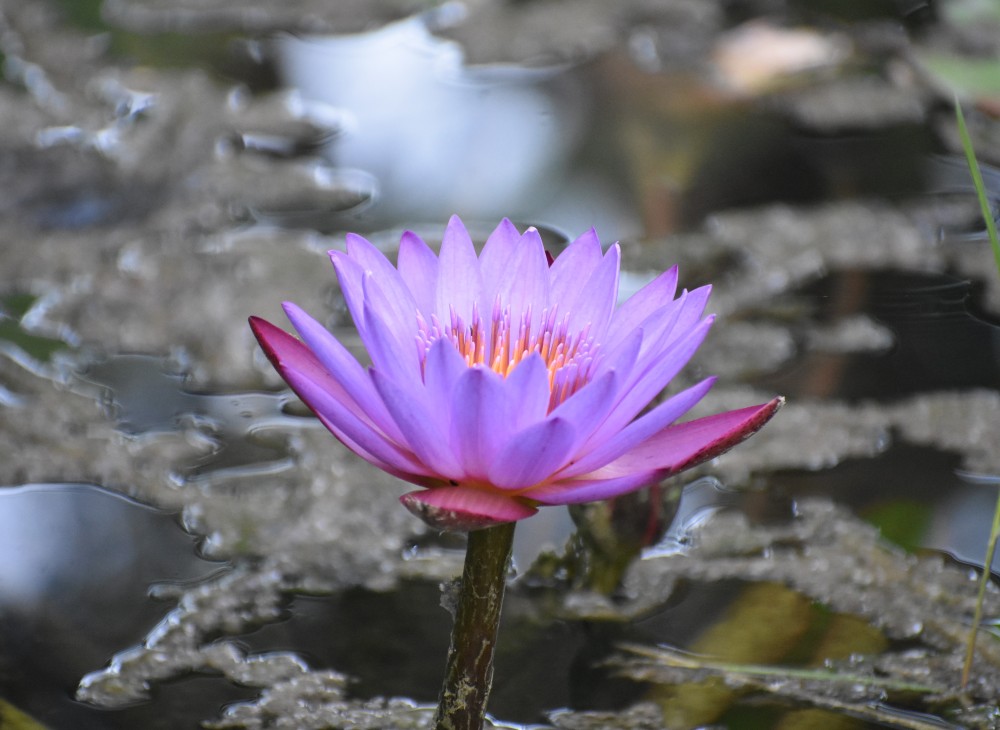
At night, I sat on my new balcony in my new house fronting a lake, drinking homemade fruit wine with Sagar. We clinked our glasses to a day well spent.
I am content to know that my book of the love poems of Rumi is with Shobha now. Those empty diaries that were burdening my bag would be filled with her poems.
Even though she had a laptop (until it was stolen), Shobha always wrote on paper. No laptop, no phone, no job, no friends, this girl lived in a coffee village and knew how to be happy in loneliness. Life handed her a cup of its most bitter truths, and she took it and drank it in one gulp. No questions asked.
Around Shobha and in my hurry to leave, I forgot to see. The walls of our hall were yellow and of a room peach. But of another room and kitchen, I can’t tell. What was the name of the white church in front of the house? Did it have flowers on the facade? There was a tea estate next to the church. How big was it?
I didn’t go back to Shobha in February or March.
Did someone on your travels change your life too?
*****
My much-awaited travel memoir
Journeys Beyond and Within…
is here!
In my usual self-deprecating, vivid narrative style (that you love so much, ahem), I have put out my most unusual and challenging adventures. Embarrassingly honest, witty, and introspective, the book will entertain you if not also inspire you to travel, rediscover home, and leap over the boundaries.
Grab your copy now!
Ebook, paperback, and hardcase available on Amazon worldwide. Make some ice tea and get reading 🙂
*****
*****
Want similar inspiration and ideas in your inbox? Subscribe to my free weekly newsletter "Looking Inwards"!

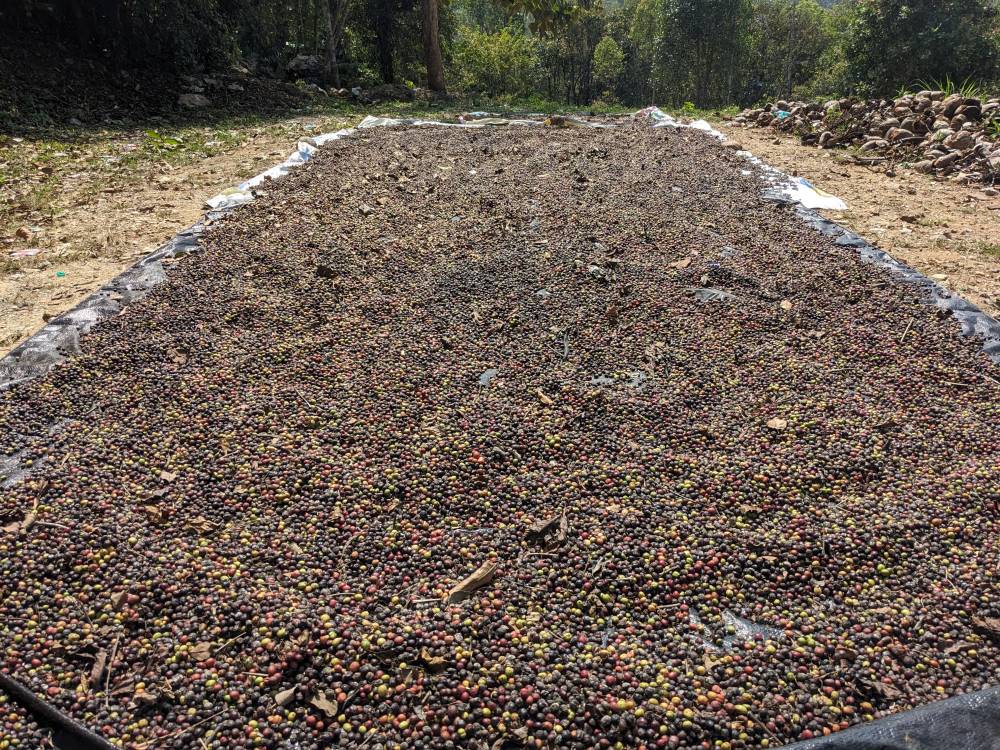
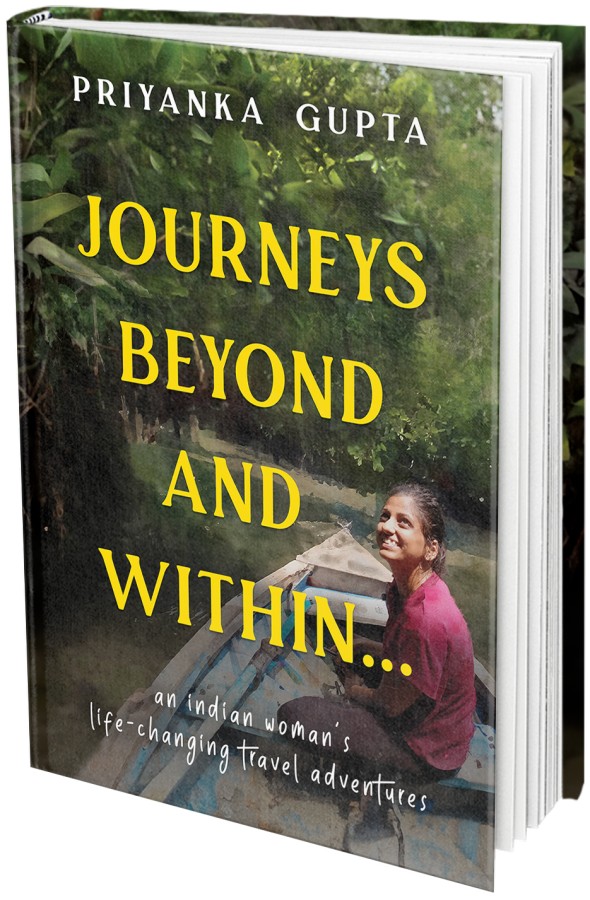
It’s lovely to read about your journey through the coffee village in Wayanad and to see the vivid life you and Sagar experienced with Shobha and the rhythms of the estate. The way you captured the simple, natural interactions around coffee plants, betel nuts, and coconut fronds brings such a warm and peaceful feeling. Thank you for sharing these beautiful moments of connection, wonder, and the joy of slowing down in the village. 🌿